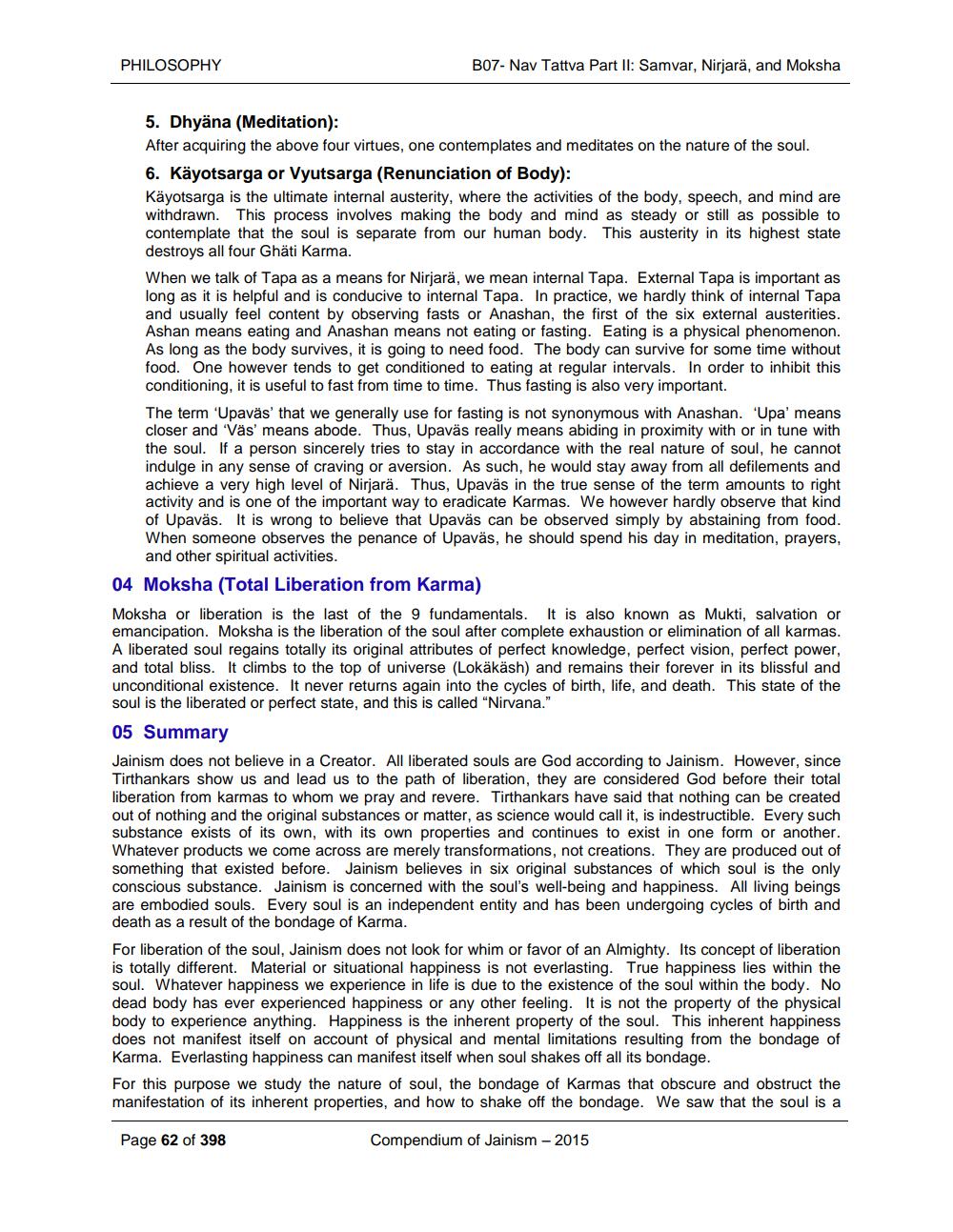________________
PHILOSOPHY
B07- Nav Tattva Part II: Samvar, Nirjarä, and Moksha
5. Dhyana (Meditation):
After acquiring the above four virtues, one contemplates and meditates on the nature of the soul.
6. Käyotsarga or Vyutsarga (Renunciation of Body):
Käyotsarga is the ultimate internal austerity, where the activities of the body, speech, and mind are withdrawn. This process involves making the body and mind as steady or still as possible to contemplate that the soul is separate from our human body. This austerity in its highest state destroys all four Ghäti Karma.
When we talk of Tapa as a means for Nirjarä, we mean internal Tapa. External Tapa is important as long as it is helpful and is conducive to internal Tapa. In practice, we hardly think of internal Tapa and usually feel content by observing fasts or Anashan, the first of the six external austerities. Ashan means eating and Anashan means not eating or fasting. Eating is a physical phenomenon. As long as the body survives, it is going to need food. The body can survive for some time without food. One however tends to get conditioned to eating at regular intervals. In order to inhibit this conditioning, it is useful to fast from time to time. Thus fasting is also very important.
The term 'Upaväs' that we generally use for fasting is not synonymous with Anashan. 'Upa' means closer and 'Väs' means abode. Thus, Upaväs really means abiding in proximity with or in tune with the soul. If a person sincerely tries to stay in accordance with the real nature of soul, he cannot indulge in any sense of craving or aversion. As such, he would stay away from all defilements and achieve a very high level of Nirjarä. Thus, Upaväs in the true sense of the term amounts to right activity and is one of the important way to eradicate Karmas. We however hardly observe that kind of Upaväs. It is wrong to believe that Upaväs can be observed simply by abstaining from food. When someone observes the penance of Upaväs, he should spend his day in meditation, prayers, and other spiritual activities.
04 Moksha (Total Liberation from Karma)
Moksha or liberation is the last of the 9 fundamentals. It is also known as Mukti, salvation or emancipation. Moksha is the liberation of the soul after complete exhaustion or elimination of all karmas. A liberated soul regains totally its original attributes of perfect knowledge, perfect vision, perfect power, and total bliss. It climbs to the top of universe (Lokäkäsh) and remains their forever in its blissful and unconditional existence. It never returns again into the cycles of birth, life, and death. This state of the soul is the liberated or perfect state, and this is called "Nirvana."
05 Summary
Jainism does not believe in a Creator. All liberated souls are God according to Jainism. However, since Tirthankars show us and lead us to the path of liberation, they are considered God before their total liberation from karmas to whom we pray and revere. Tirthankars have said that nothing can be created out of nothing and the original substances or matter, as science would call it, is indestructible. Every such substance exists of its own, with its own properties and continues to exist in one form or another. Whatever products we come across are merely transformations, not creations. They are produced out of something that existed before. Jainism believes in six original substances of which soul is the only conscious substance. Jainism is concerned with the soul's well-being and happiness. All living beings are embodied souls. Every soul is an independent entity and has been undergoing cycles of birth and death as a result of the bondage of Karma.
For liberation of the soul, Jainism does not look for whim or favor of an Almighty. Its concept of liberation is totally different. Material or situational happiness is not everlasting. True happiness lies within the soul. Whatever happiness we experience in life is due to the existence of the soul within the body. No dead body has ever experienced happiness or any other feeling. It is not the property of the physical body to experience anything. Happiness is the inherent property of the soul. This inherent happiness does not manifest itself on account of physical and mental limitations resulting from the bondage of Karma. Everlasting happiness can manifest itself when soul shakes off all its bondage.
For this purpose we study the nature of soul, the bondage of Karmas that obscure and obstruct the manifestation of its inherent properties, and how to shake off the bondage. We saw that the soul is a
Page 62 of 398
Compendium of Jainism - 2015




